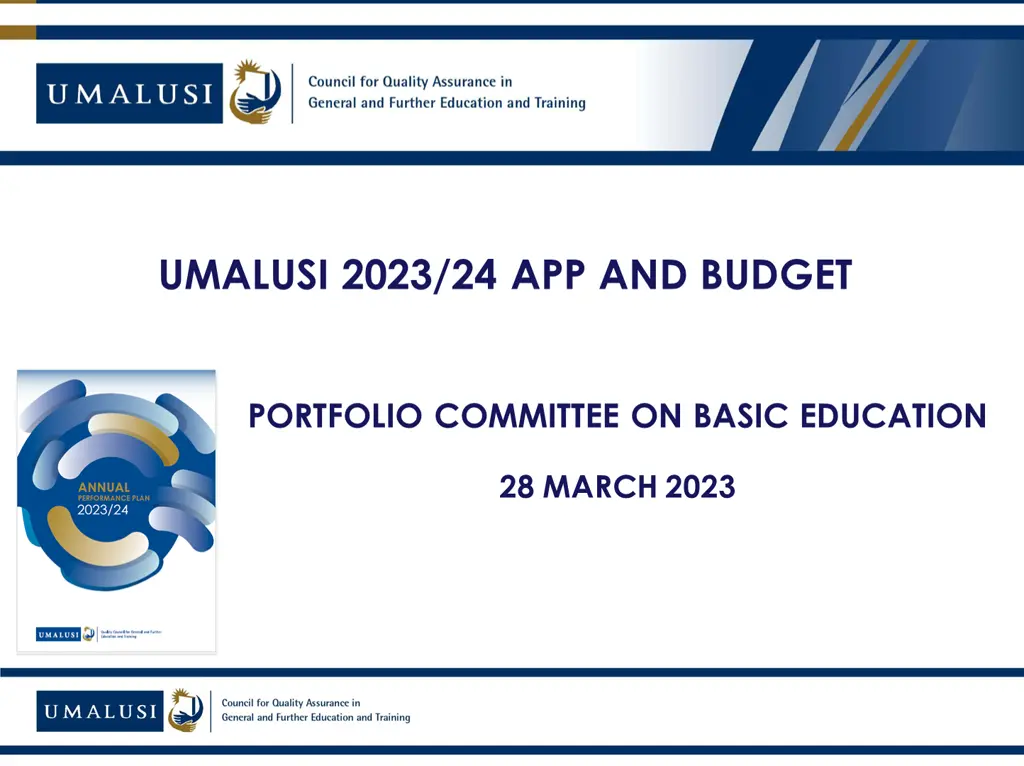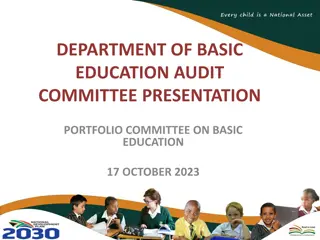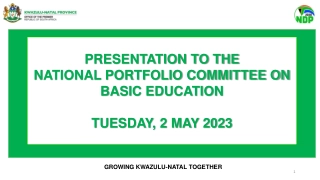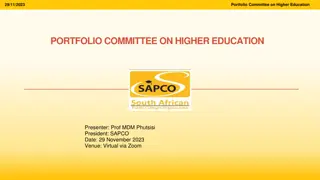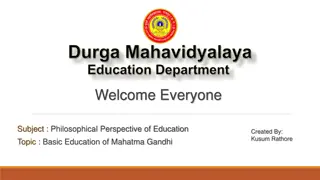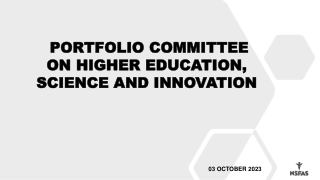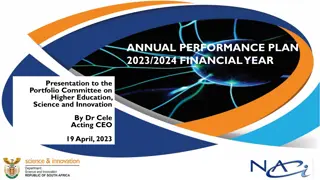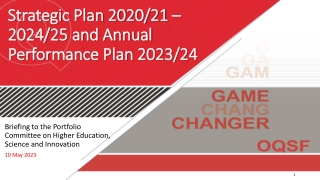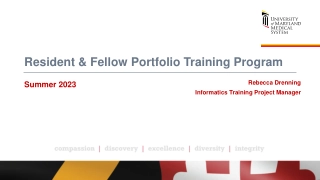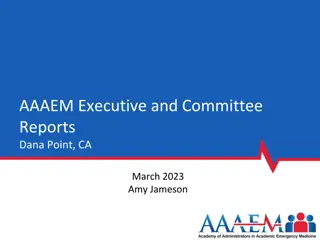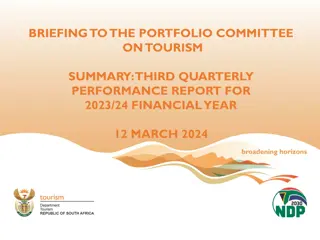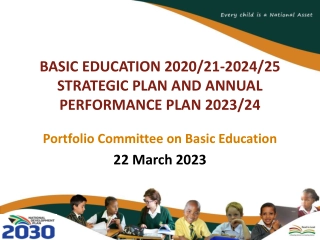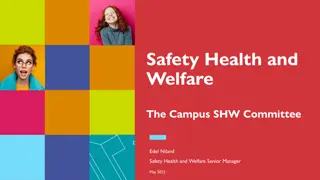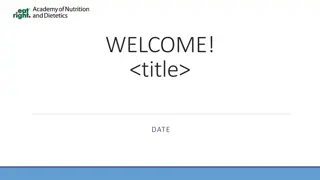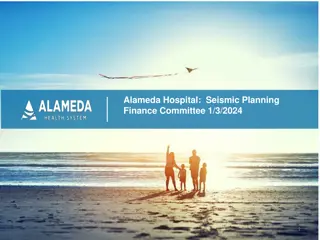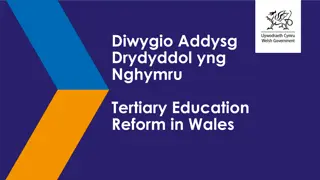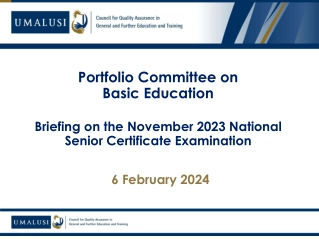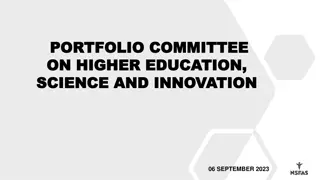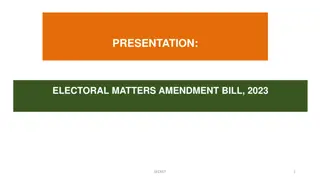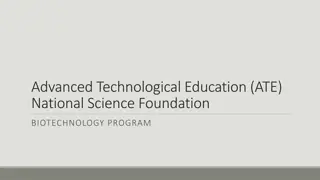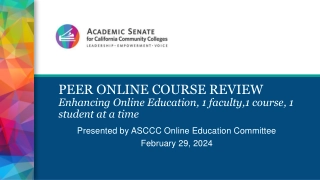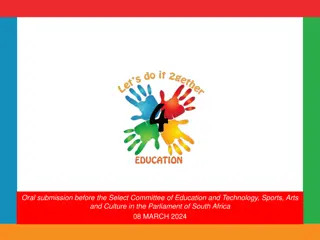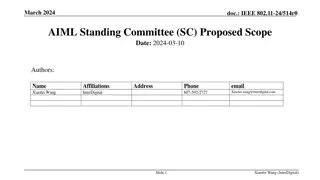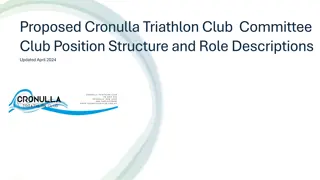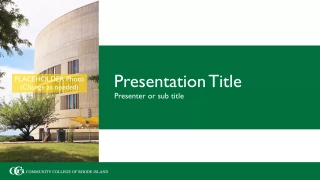Portfolio Committee on Basic Education
The mandate, strategic focus, performance measurements, and budget for Umalusi in the 2023/24 fiscal year. It provides an overview of Umalusi's responsibilities and policies regarding quality assurance in general and further education and training.
Download Presentation
Please find below an Image/Link to download the presentation.
The content on the website is provided AS IS for your information and personal use only. It may not be sold, licensed, or shared on other websites without obtaining consent from the author. Download presentation by click this link. If you encounter any issues during the download, it is possible that the publisher has removed the file from their server.
Presentation Transcript
UMALUSI 2023/24 APP AND BUDGET PORTFOLIO COMMITTEE ON BASIC EDUCATION 28 MARCH 2023
Presentation Outline A. Mandate .. .. 4 B. Strategic Focus .. 10 C. Measuring Performance .. . 15 D. Budget 2023/24-2025/26 .. .. 29 2
Mandate Umalusi s mandate is determined by: Chapter 2: Everyone has a right to education Establishment of Umalusi as a Quality Council Assigns Umalusi the responsibility for quality assurance of general and further education and training 4
Mandate cont Umalusi is the Quality Council responsible for qualifications registered on the General and Further Education and Training Qualifications Sub-framework (GFETQSF) on the National Qualifications Framework (NQF). The education and training have the capacity to deliver and assess qualifications and learning programmes and are doing so to expected standards of quality. Council ensures that the providers of 5
Institutional Policies The General and Further Education and Training Qualifications Sub- framework: 2014; Guidelines on Strategy and Priorities for the NQF 2011/2012: Minister of Higher Education and Training; National policies governing existing qualifications (including their assessment) that are currently certificated by Umalusi; Standard setting and quality assurance of the General and Further Education and Training Qualifications Sub-framework: Umalusi, 2014; Council policies and directives on the conduct, administration and management of the assessments for qualifications on the GFETQSF; 6
Institutional Policies cont The regulations pertaining to qualifications on the GFETQSF developed by the Department of Basic Education (DBE) and gazetted by the Minister on assessment and certification, including those promulgated by provincial legislatures and the policy framework that applies to all technical and vocational education and training (TVET) colleges declared or established by the Minister under the Continuing Education and Training Act, Act No. 16 of 2006; The Policy and Criteria for the development, registration and publication of qualifications on the GFETQSF; The Policy for the Re-Issue of National Certificates The Recognition of Prior Learning (RPL) Policy; 7
Institutional Policies cont Policy documents and guidelines pertaining to the National Senior Certificate (NSC), Senior Certificate (amended) (SC(a)), General Education and Training Certificate (GETC), National Certificate (Vocational) (NC(V)), National Education Report 190/191 (NATED) and the national curriculum statements (NCS); and any other qualifications on the General and Further Education and Training Qualifications Sub-framework (GFETQSF), as applicable; Treasury Regulations; and Any other appropriate legislation related to the various education and training sectors in which Umalusi is mandated to work. 8
Strategic Priorities Reviewing the quality assurance approach Reviewing, evaluating and appraising qualifications submitted for registration on the GFETQSF; Providing input to the legislative framework Intensifying research on educational developments linked to the sub-framework to innovate and to advise the appropriate ministers of education Intensifying advocacy to communicate accurate and relevant messages to all stakeholders on issues relating to qualifications on our sub-framework. 9
PART B: STRATEGIC FOCUS 10
Performance Environment Review of the Quality Assurance approach The instrument for external moderation of the GETC question papers has been reviewed. The design appropriate for this qualification is at a conceptual stage Demand for credible qualifications Umalusi benchmarked the NSC against five other school leaving qualifications (the AS and A levels of the Cambridge International Examination (CIE: AS and A levels), the International Baccalaureate (IB: Diploma), Kenya (Senior Secondary), the New South Wales (Senior Secondary) and Zimbabwe (Senior Secondary). The NSC has been found to be comparable to these qualifications. Demand for Umalusi qualifications outside South Africa Based on legal advice, 2022 was the last year that the NSC was offered outside the borders of South Africa. The NATED programmes (N1 N3) will also be phased out in the neighbouring countries where they are offered Use of communication platforms by stakeholders The organisation uses MS teams for webinars, YouTube for short videos, Facebook Live for live- streaming, digital banners on Facebook, Twitter and LinkedIn & the GCIS radio facility connecting to all community Radio stations 11
Performance Environment Quality Assurance of Assessment Trends in QAA activities, i.e. the moderation of question papers, monitoring of the writing of examinations, monitoring of marking centres, and verification of marking for various subjects reflect an increase in the services provided Qualifications, Certification, and Verification Certification numbers dropped in 2019 and 2020 but have increased again in 2021. Verification numbers dropped in 2020/21 due to the impact of COVID-19 but went back to normal in 2021/22 Evaluation and Accreditation Institutions granted a window period to improve have reduced from 190 in 2019/20 to 10 in 2022/23 due to a drop in initial site visits Evaluation and appraisal of new qualifications GEC qualification: Umalusi is still awaiting the resubmission of the GEC qualification policy for quality assurance processes to be done. Empowerment of women, youth and people with disabilities Proposals for 2023/24 under four pillars: Accountability, Social Cohesion, Economic Empowerment, and Research and Information Management 12
Performance Environment Organisational structure and Human resource capacity The organogram has increased from 138 to 150 posts. Though the vacancy rate has been maintained under 10%, there were up to 23 resignations by the end of quarter 3. Facilities The construction of Thuto-Mfundo building has been completed. The building plans for the renovation of Umalusi House have been approved to address OHS deficiencies e.g. accessibility to people with disabilities Financial Resources A third clean audit for 2021/22. The increase in fuel prices and the high inflation rate exert financial pressure on the organisation s budget (the cost drivers for the moderation of question papers, site visits and verification of marking are flights, car rental, and accommodation) Information and Communication Technology ICT Network health score maintained at 97%. The implementation of Microsoft Azure cloud addresses the risk of the aging ICT infrastructure. Umalusi has developed an online certification replacement system Communication Management Umalusi added a new external communication platform, Wikipedia 13
Progress on Outcomes Progress made Outcome Efficient and effective administrative systems Management reviews and adheres to the organisation's policies and regulations Umalusi verifies performance information evidence regularly to avoid the risk of inaccurate reporting Human capital management policies are regularly reviewed and approved by the CEO and Council There is an e-procurement system to enhance SCM processes to manage risks and compliance Quality assurance activities are being successfully conducted There is a significant improvement in the quality and standard of question papers, as reflected in the low number of question papers returned to assessment bodies for amendments state of readiness (SOR) was conducted for all assessment bodies Directives for compliance and improvement are issued to the assessment bodies The organisation standardised examination results The number of accredited private education institutions is growing steadily showing adherence to the set standards Enhanced educational standards 14
PART C: MEASURING PERFORMANCE 15
Measuring Performance Outputs *Evaluated curricula *Accredited institutions *Verified qualifications *Standardised results *Moderated assessments *Printed certificates Outcome Enhanced educational standards Impact Relevant and credible qualifications 16
PROGRAMME 1: ADMINISTRATION Programme Purpose To provide administrative services to the organisation strategic leadership, management and Sub-programmes: Strategy and Governance (S&G) Public Relations and Communications (PR & Comms) Information and Communications Technology (ICT) Human Capital Management (HCM) Finance and Supply Chain Management (F&SCM) 17
Programme 1 Indicators & Targets Outputs Output Indicators Annual Target Q1 Q2 Q3 Q4 1.1: Advocacy initiatives 1.1.1: Number of advocacy initiatives conducted 8 2 2 2 2 1.2: Achieved ICT network health score 1.3: Minimised vacancy rate 1.2.1: ICT Network health score maintained at 97% 97% 97% 97% 97% 97% 1.3.1: Average vacancy rate maintained at 10% 10% 10% 10% 10% 10% 1.4: Paid invoices 1.4.1: Average number of days for payment of creditors and suppliers 30 30 30 30 30 18
Programme 2: Qualifications and Research (Q&R) Programme Purpose: The purpose of the programme is to develop and manage an efficient and effective GFETQSF within the NQF and to undertake strategic research in support of that goal. Sub-Programmes Sub-Programme 2.1: Qualifications, Curriculum and Certification (QCC) The purpose of the QCC sub-programme is to manage the GFETQSF qualifications. Sub-Programme 2.2.: Statistical Information and Research (SIR) The purpose of the SIR sub-programme is to provide a platform for research, statistical support and the standardisation of learner results to inform Council s professional work and organisational strategy. 19
Programme 2 Indicators & Targets Outputs Output Indicators Annual Target Q1 Q2 Q3 Q4 2.1: Reports on management of qualifications 2.1.1: Number of reports produced on the management of qualifications in the sub-framework 1 - - - 1 2.2: Reports on the certification of learner achievements 2.3: Reports on the verification of certificates issued 2.2.1: Number of reports produced on the certification of learner achievements for qualifications in the sub-framework 2.3.1: Number of reports produced on the verification of qualifications (certificates) in the sub-framework 4 1 1 1 1 4 1 1 1 1 2.4: Completed research reports 2.4.1: Number of research reports completed in various formats 6 - - - 6 20
Programme 3: Quality Assurance and Monitoring (QAM) Programme Purpose To ensure that the providers of education and training have the capacity to deliver and assess qualifications registered on the GFETQSF and are doing so to the expected standards and quality. Sub-Programmes Sub-Programme 3.1: Quality Assurance of Assessment: School Qualifications Purpose of this sub-programme is to ensure credibility of assessment and examination results of school qualifications registered on the GFETQSF. Sub-Programme 3.2: Quality Assurance of Assessment: Post-School Qualifications Purpose: To ensure credibility of assessment and examination results of post-school qualifications registered on the GFETQSF. Sub-Programme 3.3: Evaluation and Accreditation Purpose: To quality assure the delivery of qualifications registered on the GFETQSF at private education institutions and the capacity of private assessment bodies to assess those qualifications. 21
Programme 3 Indicators & Targets Outputs Output indicators Annual Target Q1 Q2 Q3 Q4 3.1: Published QAA reports 3.1.1: Number of quality assurance of assessment reports published for qualifications registered on the GFETQSF 9 - 1 1 7 3.2: Approved question papers 3.2.1: Percentage of question papers approved per qualification 3.3.1: Number of assessment bodies audited for their state of readiness to conduct examinations 100% 100% - - - 3.3: Audited Assessment bodies for SOR 4 4 - - - 3.4: Verified marking 3.4.1: Number of subjects for which verification of marking is conducted - - - 92 92 22
Programme 3 Indicators & Targets Outputs Output Indicators Annual Target Q1 Q2 Q3 Q4 3.5: Moderated internal assessment 3.5.1: Number of subjects for which moderation of internal assessment is conducted - - - 195 195 3.6: Accredited outcomes for private education institutions 3.6.1: Percentage of accreditation outcomes for private education institutions finalised within 12 months of the site visit 87% - - - 87% 3.7: Monitored private education institutions 3.7.1: Percentage of identified private education institutions monitored after being granted accreditation 90% - - - 90% 23
Priorities 2021/22 Strategic Plan 2020-2024 Review the quality assurance of assessment approach so as to accommodate new qualifications and improve the status quo 2020/21 2022/23 2023/24 Review the quality assurance of assessment approach so as to accommodate new qualifications and improve the status quo Reviewing the quality assurance of assessment approach in view of the budget cuts and the COVID-19 impact Review the quality assurance of assessment approach so as to accommodate new qualifications and improve the status quo Reviewing the quality assurance approach; Continued evaluation of qualifications on the Umalusi sub- framework and appraising the relevant curricula Actively participating in the processes of amending the founding Acts to accommodate new qualifications; Evaluate and appraise new and reviewed qualifications Evaluate and appraise new and reviewed qualifications Reviewing, evaluating and appraising qualifications submitted for registration on the GFETQSF Providing input to the founding acts to accommodate new qualifications and desired extensions to the mandate for quality assurance Evaluate and appraise new and reviewed qualifications Amend the founding Acts to accommodate new qualifications and desired extensions in the mandate of quality assurance Amend the founding Acts to accommodate new qualifications and desired extensions in the mandate of quality assurance Providing input to the legislative framework 24
Priorities 2021/22 Strategic Plan 2020-2024 2020/21 2022/23 2023/24 Intensify research on educational developments to innovate and advise the Ministers of Education Intensify research on educational developments to innovate and advise the Ministers of Education Intensifying research on educational developments to provide evidence-based advice to the Ministers of Education Intensifying research on educational developments linked to the sub- framework to innovate and to advise the appropriate ministers of education Intensifying the advocacy to communicate accurate and relevant messages to all stakeholders on issues relating to qualifications on our sub- framework. Intensifying research on educational developments linked to the sub- framework to innovate and to advise the appropriate ministers of education Intensifying advocacy to communicate accurate and relevant messages to all stakeholders on issues relating to qualifications on our sub- framework Intensify advocacy on qualifications within the sub- framework Intensify advocacy on qualifications within the sub- framework Intensifying the advocacy to communicate accurate and relevant messages to all stakeholders on issues relating to qualifications on our sub- framework. 25
Indicator changes 2021/22 Indicators 2020/21 2022/23 2023/24 1.1.1 Advocacy exhibitions Advocacy webinars Advocacy webinars Advocacy initiatives 1.4.1 % of service providers paid in 30 days % of service providers paid in 30 days Average no. of days for payment of service providers Average no. of days for payment of service providers 2.2.1 % of error-free certificates printed % of error-free certificates printed No. of reports produced on certification No. of reports produced on certification 2.3.1 % of verifications completed in 2 days % of verifications completed in 2 days No. of reports produced on verification of qualifications No. of reports produced on verification of qualifications 26
Focus Areas 2022/23 2023/24 2020/21 2021/22 GEC/NASCA Research Moderation Non-certification of learners Phasing out of the NATED programmes GFETQSF policies NSC benchmark Alignment of qualifications NASCA& GETCA appraisal Articulation of qualifications Reconfiguration of SBA Non-certification of learners Reviewing of policies Benchmarking of qualifications Alignment of qualifications Appraisal of curricula Conducting research Reconfiguration of SBA Certification of learners Conducting QAA processes GFETQSF policies & associate policies Offering foreign qualifications e.g. IE Registering the GEC qualification Research on NASCA, GETCA & GEC Appraisal of curricula QAA processes in the centralised GETC: ABET exams Strengthening internal assessment Implementing revised application process for private colleges 27
Targets that have changed 2020 2021 2022 2023 1.1.1: Number of advocacy webinars 4 4 8 8 2.4.1: Number of research reports completed in various formats 4 5 5 6 3.4.1: Number of subjects for which verification of marking is conducted 84 (70) (85) 88 93 90 92 3.5.1: Number of subjects for which moderation of internal assessment is conducted 125 (85) 180 125 198 190 195 3.6.1: % of accreditation outcomes finalised within 12 months of a site visit 82% 94.8% 85% 100% 86% 87% 28
PART D: BUDGET 2023/24 -2025/26 29
Overview Financial Year 2022/2023 The original approved budget amounted to R187,7 million. This budget consists of a DBE R162 million (86%) grant and R25 million (14%) own revenue. As of 28 February 2023, the DBE grant was received in total, and R30 million of own income. Umalusi will therefore exceed its annual revenue budget. The infrastructure project commenced during the previous financial year, 2021/22, with most of the work performed during the 2022/23 financial year. The total expenditure on this project amounts to R39,5 million, representing 89% of the total contract value, and the final account is still outstanding. The practical completion certificate has been received, and the facility is being used. The internal financial year-end (2022/23) process has started to ensure the financial year can be closed successfully and reporting requirements can be achieved. 30
Overview: 2023/24 Financial Year 2023/2024 The total budget amounts to R197 Million. DBE grant allocation: 2021/22 R157,4 million 2022/23 R162,0 million an increase of 2,94% 2023/24 R162,9 million an increase of 0,56% 2024/25 R169,4 million an increase of 3,94% 2025/26 R177,0 million an increase of 4,48% Own Revenue: 2021/22 R28,8 million 2022/23 R31,5 million an increase of 9,36% 2023/24 R34,5 million an increase of 9,54% 2024/25 R36,3 million an increase of 5,35% 2025/26 R39,0 million an increase of 7,41% Future Financial Years Budget Estimates 2024/25 R205 million 2025/26 R215 million 32
Own Revenue The following are the primary revenue contributors: Verification Is the process followed by Umalusi to establish the authenticity of qualifications or certificates. Over the past six years, 250,593 verification were done annually on average. Accreditation Umalusi accredit private education institutions to ensure compliance with Section 29(3)(c) of the South African Constitution to ensure that independent educational institutions maintain standards. (Independent schools, private FET colleges and private AET colleges) Certification Is the process followed by Umalusi to issue certificates to candidates who have successfully complied with the requirements for a qualification. Over the past six years, 1,124,767 certificates were issued annually on average. Quality Assurance of Assessment Charges Comprehensive Assessment Institute (SACAI) from Independent Examinations Board (IEB) and the South African Interest received Investment of available funds 33
Total Revenue 2021/22 2022/23 2023/24 2024/25 2025/26 Description R 000 R 000 R 000 R 000 R 000 DBE Allocation R157,400 162,031 R162,945 R169,365 R176,953 Verification R11,934 R12,452 R13,249 R14,097 R15,061 Accreditation R5,195 R4,139 R10,796 R11,120 R11,824 Certification R5,695 R2,049 R2,776 R2,954 R3,205 Quality Assurance R2,534 R4,696 R3,782 R4,024 R4,343 Interest R2,403 R1,269 R2,068 R2,212 R2,368 Rent R1,023 R1,087 R1,812 R1,921 R2,220 Total Revenue R186,184 R187,723 R197,428 R205,693 R215,974 34
Expenditure Goods & Services + Other Total Budget Compensation % of Total Budget Goods & Sertvices + Other % of Total Compensation Financial Year R'000 R85 506 R92 599 R99 367 R103 527 R108 703 R'000 R'000 R179 301 R193 177 R197 428 R205 693 R215 974 2021/22 2022/23 2023/24 2024/25 2025/26 48% 48% 50% 50% 50% R93 795 R100 578 R98 061 R102 166 R107 271 52% 52% 50% 50% 50% 35
Comments on the 2023/24 budget: Compensation of Employees (CoE) aligns with the Department of Public Service and Administration (DPSA). The Umalusi Council has approved twelve additional posts for filling during the 2023/24 year to relieve some of the work pressure. 59% of the total expenditure is allocated to the national operations (programmes 2 and 3) of Umalusi, whereas the administration takes 41% of the total budget. Programme 1 = 41% - R80,050 million (CoE) = R44,4 million, Other = R35,6 million) Programme 2 = 17% - R32,853 million (CoE) = R21,7 million, Other = R11,1 million) Programme 3 = 43% - R84,525 million (CoE) = R33,1 million, Other = R51,4 million) Goods and services are expected to remain mainly the same because some processes will continue to be performed online as a cost-saving and efficiency measure. National operations utilise 64% of the budget A large portion of this funding relates to contract and seasonal workers remuneration Administration utilises the remaining 36 % of the budget for activities such as: External Audit Outsourced Internal Audit Building maintenance Operational expenditures such as diesel for generators, municipal accounts, copiers etc. . 36
Umalusis 20thAnniversary Celebration Umalusi is celebrating its 20th anniversary this year under the theme: Two Decades of Education Guardianship. 2002-2022 38
THANK YOU We would like to sincerely thank the Minister of Basic Education, Mrs Angie Motshekga, the Deputy Minister, Dr Makgabo Reginah Mhaule, and our Council for their continued support. Thank you very much to the Chairperson of the Portfolio Committee on Basic Education, Ms Mbinqo-Gigaba and the Portfolio Committee members for this opportunity to present Umalusi s 2023/24 Annual Performance Plan and the 2023/24 MTEF Budget. Dr MS Rakometsi 39
012 349 1510 0800 408 409 Mafu.Rakometsi@umalusi.org.za Lesego.Ndala@umalusi.org.za info@umalusi.org.za 36
